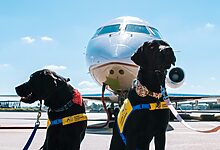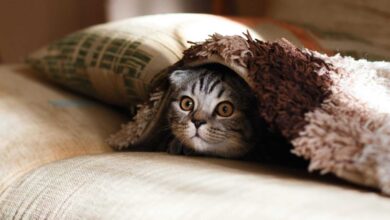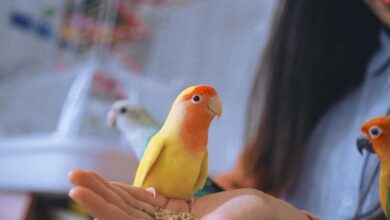Conquer Common Bird Behavior Problems: 10 Solved! Frustrating Feathered Dilemmas
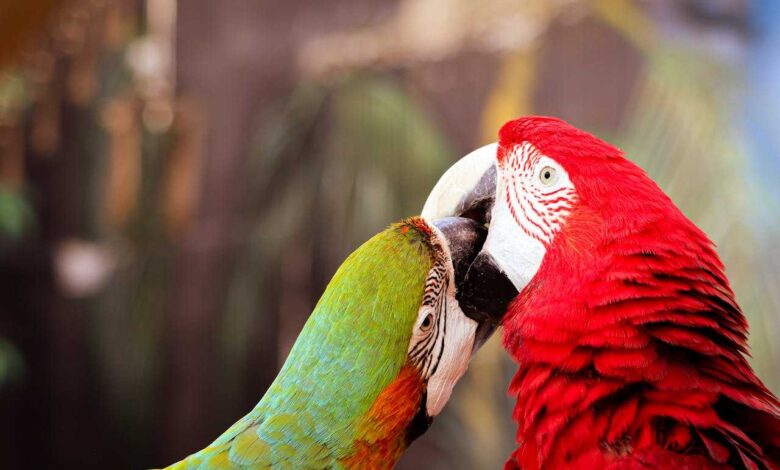
Birds make wonderful pets with their vibrant colors, charming personalities, and the ability to bond with their human companions. However, they can also present various behavior problems that can be frustrating for bird owners. This comprehensive guide will explore ten common bird behavior problems and provide effective solutions to help you understand and address these issues.
Does your feathered friend seem a little…off lately? Excessive screeching, feather flinging, or those sharp nips that leave you wondering what you did wrong? While our avian companions bring us immense joy with their vibrant personalities and playful antics, sometimes their behaviors can leave us scratching our heads. Fear not, fellow bird enthusiasts! Here, we’ll delve into the world of common bird behavior problems, shedding light on the reasons behind them.
We’ll explore the root causes of frustrating behaviors like feather plucking, aggression, and that ear-splitting screeching. More importantly, we’ll equip you with a toolbox of solutions to promote positive behavior and foster a harmonious relationship with your feathered friend. Whether you’re facing a recent outburst or simply want to be proactive about creating a happy and well-adjusted bird, this guide is here to empower you.
So, grab a comfy spot, gather some treats for your feathered companion (bribery can be a powerful tool!), and let’s embark on this journey together!
Excessive Screaming
Why Is My Bird Screaming?
Birds naturally vocalize, but excessive screaming can indicate an underlying issue. Common reasons include boredom, lack of attention, or discomfort. Understanding the root cause of your bird’s screaming is essential to effectively address the behavior.
Solution: Enrich the Environment
- Toys and Activities: Birds need mental stimulation to prevent boredom. Provide a variety of toys, including foraging toys, puzzle toys, and shredding toys. Rotate toys regularly to maintain your bird’s interest.
- Interaction: Birds are social creatures and require regular interaction with their human caregivers. Spend quality time with your bird daily by talking, singing, and playing with them. Consider training sessions that can stimulate your bird mentally and physically.
- Routine: Establish a consistent daily routine to give your bird a sense of security. Birds thrive on predictability, and a stable routine can reduce stress and anxiety, which may decrease excessive screaming.
Relevant Resource: PetMD – Bird Screaming
Positive Reinforcement for Quiet Behavior
Positive reinforcement is a powerful tool for modifying behavior. Reward your bird when it is quiet with treats, praise, or attention. This reinforcement will encourage the bird to repeat the quiet behavior.
Relevant Resource: Bird Tricks – Quiet Training
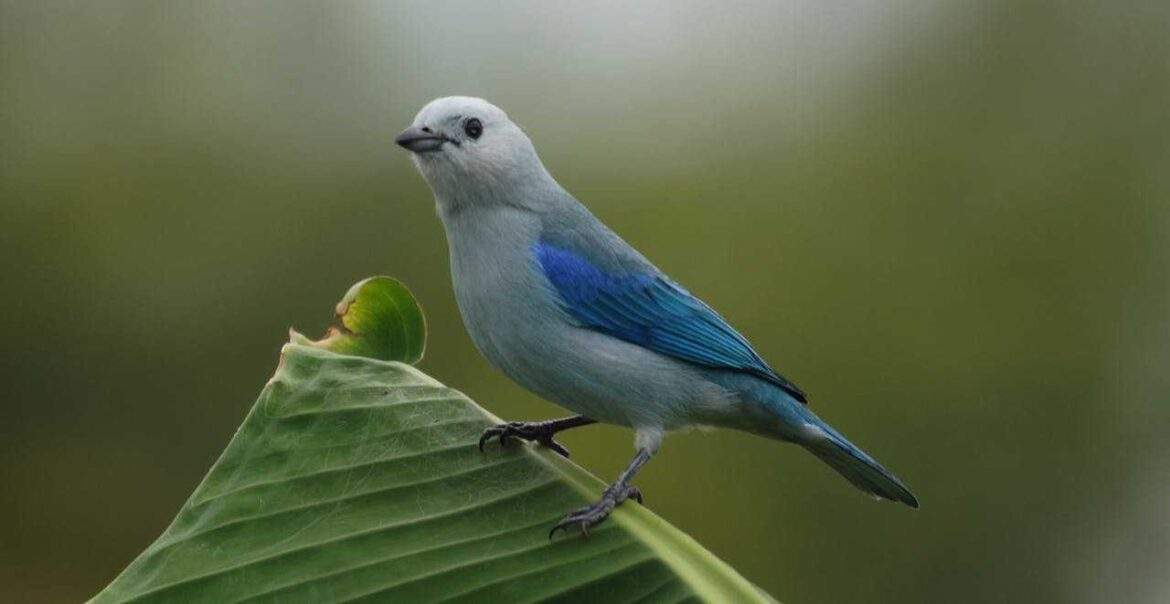
Feather Plucking
Why Does My Bird Pluck Its Feathers?
Feather plucking is a serious issue that can result from stress, boredom, nutritional deficiencies, or medical problems. Feather plucking can lead to significant health problems if not addressed promptly.
Solution: Address Underlying Causes
- Veterinary Check-Up: The first step in addressing feather plucking is to consult an avian vet to rule out medical issues. Conditions like skin infections, allergies, and parasites can cause discomfort leading to feather plucking.
- Diet: Ensure a balanced diet rich in vitamins and minerals. Malnutrition can lead to feather plucking. Provide a variety of fruits, vegetables, pellets, and seeds to meet your bird’s nutritional needs.
- Environmental Enrichment: Provide mental stimulation and physical activities to reduce boredom. Include a variety of toys, perches of different textures and sizes, and opportunities for foraging.
Relevant Resource: VCA Hospitals – Feather Plucking
Understanding Bird Body Language
Learning to understand your bird’s body language can help you identify stress and anxiety before it leads to feather plucking. Signs of stress include fluffed feathers, panting, and a lack of vocalization.
Relevant Resource: Bird Channel – Body Language
Aggression Towards Humans
Why Is My Bird Aggressive?
Aggression can stem from fear, territorial behavior, or hormonal changes. Understanding the triggers for aggression can help you address the behavior effectively.
Solution: Positive Reinforcement and Training
- Training: Use positive reinforcement techniques to reward good behavior and discourage aggression. Training sessions can help build trust and reduce fear-based aggression.
- Socialization: Gradually introduce your bird to new people and environments to reduce fear. Socialization should be done slowly and carefully to prevent overwhelming your bird.
- Hormonal Management: Reduce triggers for hormonal aggression by limiting daylight hours and avoiding petting that stimulates breeding behavior. Reducing exposure to breeding cues can help manage hormonal aggression.
Relevant Resource: The Spruce Pets – Aggressive Bird Behavior
Redirecting Unwanted Bird Behavior
If your bird shows signs of aggression, redirect its behavior with training and toys. Provide alternative activities that can help your bird expend its energy and reduce aggressive tendencies.
Relevant Resource: BirdTricks – Redirecting Aggression
Biting
Why Does My Bird Bite?
Birds may bite due to fear, lack of socialization, or as a form of communication. Identifying the cause of biting is essential for addressing the behavior.
Solution: Understanding and Redirecting Behavior
- Body Language: Learn to read your bird’s body language to anticipate and prevent bites. Understanding cues like pinning eyes, fluffed feathers, and defensive postures can help you avoid bites.
- Training: Teach your bird to step up onto a perch or hand gently. Use treats and praise to reinforce positive interactions. Training sessions should be short and positive to maintain your bird’s interest.
- Consistency: Be consistent in your responses to biting to avoid reinforcing the behavior. Avoid reacting dramatically to bites, as this can reinforce the behavior.
Relevant Resource: Petfinder – Bird Biting
Positive Reinforcement for Non-Biting Behavior
Reward your bird for gentle interactions and non-biting behavior. Positive reinforcement can help reinforce desirable behaviors and reduce biting.
Relevant Resource: Parrot Wizard – Stop Biting
Destructive Chewing
Why Is My Bird Chewing Everything?
Destructive chewing is often a result of boredom or the need to exercise beak muscles. Birds naturally chew to explore their environment and keep their beaks healthy.
Solution: Provide Safe Chew Toys
- Toys: Offer a variety of chewable toys made from bird-safe materials. Toys made of wood, rope, and natural fibers can provide healthy outlets for chewing.
- Cage Enrichment: Add branches, ropes, and other items to encourage natural foraging and chewing behaviors. Providing a variety of textures and shapes can keep your bird engaged.
- Supervision: Monitor your bird when they are out of the cage to prevent damage to household items. Provide appropriate alternatives for chewing to protect your belongings.
Relevant Resource: Bird Channel – Chewing in Birds
Enriching a Bird’s Cage
A well-enriched cage can prevent destructive chewing by keeping your bird mentally stimulated. Include perches of various sizes and textures, toys, and foraging opportunities.
Relevant Resource: The Spruce Pets – Enriching Bird Cage
Anxiety and Stress
Why Is My Bird Acting Strange?
Birds can exhibit strange behaviors due to anxiety and stress caused by changes in their environment, lack of stimulation, or improper handling.
Solution: Create a Calm and Stimulating Environment
- Consistency: Maintain a consistent daily routine to reduce stress. Birds thrive on predictability, and a stable routine can reduce anxiety.
- Enrichment: Provide a variety of toys, perches, and activities to keep your bird mentally stimulated. Enrichment can help reduce boredom and anxiety.
- Handling: Handle your bird gently and regularly to build trust and reduce fear. Positive interactions can help reduce stress and anxiety.
Relevant Resource: Avian Welfare Coalition – Bird Stress
Addressing Bird Stress Factors
Identify and address factors that may be causing stress in your bird. Common stressors include changes in the environment, loud noises, and lack of social interaction.
Relevant Resource: PetMD – Bird Stress
Separation Anxiety
Why Does My Bird Get Anxious When I Leave?
Separation anxiety can cause birds to become distressed when left alone. Birds are social creatures and can become anxious when their human companions are not around.
Solution: Gradual Desensitization
- Routine: Establish a routine that includes regular periods of alone time. Gradually increase the time your bird spends alone to help them adjust.
- Comfort Items: Leave familiar toys or items with your scent to comfort your bird. Familiar items can help reduce anxiety when you are not around.
- Training: Gradually increase the time you spend away from your bird to help them adjust. Positive reinforcement can help your bird learn to be comfortable alone.
Relevant Resource: PetMD – Bird Separation Anxiety
Positive Reinforcement for Independence
Encourage your bird to be independent by rewarding calm and quiet behavior when you are not around. Positive reinforcement can help your bird learn to be comfortable alone.
Relevant Resource: Pet Birds by Lafeber – Separation Anxiety
New Bird Introduction Problems
How to Introduce a New Bird?
Introducing a new bird can be challenging and may lead to aggression or stress.
Proper introduction techniques can help ensure a smooth transition.
Solution: Slow and Controlled Introduction
- Separate Cages: Start by keeping the new bird in a separate cage. Allow the birds to see and hear each other without direct contact.
- Gradual Interaction: Gradually increase the time the birds spend together under supervision. Monitor their interactions to ensure there is no aggression.
- Positive Reinforcement: Reward both birds for calm and positive interactions. Positive reinforcement can help build a positive association between the birds.
Relevant Resource: Birds Online – Introducing New Birds
Bird Socialization
Socialization is essential for birds to develop positive interactions with other birds and humans. Gradual and positive introductions can help prevent aggression and stress.
Relevant Resource: Petfinder – Bird Socialization
Dealing with a Hormonal Bird
Why Is My Bird Acting Aggressively?
Hormonal changes can cause birds to become aggressive, territorial, or display other unwanted behaviors. Hormonal behaviors are natural but can be managed.
Solution: Reduce Hormonal Triggers
- Daylight Hours: Reduce the amount of daylight your bird is exposed to. Limiting daylight hours can help manage hormonal behavior.
- Handling: Avoid petting that stimulates breeding behavior. Limit handling to avoid triggering hormonal responses.
- Environment: Remove nesting materials and other triggers from your bird’s environment. Reducing exposure to breeding cues can help manage hormonal behavior.
Relevant Resource: The Spruce Pets – Hormonal Bird Behavior
Redirecting Hormonal Behavior
Redirect your bird’s hormonal behavior by providing alternative activities and enrichment. Engaging your bird in training sessions and play can help reduce hormonal behaviors.
Relevant Resource: BirdTricks – Managing Hormonal Birds
Loud Bird at Night
Why Is My Bird Loud at Night?
Birds may become loud at night due to fear, discomfort, or environmental factors. Understanding the cause of nighttime noise can help you address the issue.
Solution: Create a Calm Sleeping Environment
- Cover the Cage: Covering the cage at night can help reduce noise and create a sense of security. Use a breathable cover to allow airflow.
- Consistent Sleep Schedule: Establish a consistent sleep schedule to help your bird develop a routine. Birds need 10-12 hours of uninterrupted sleep each night.
- Quiet Environment: Ensure your bird’s sleeping area is quiet and free from disturbances. Reducing noise and light can help your bird sleep peacefully.
Relevant Resource: Birds Online – Nighttime Noise
Addressing Bird Stress Factors
Identify and address factors that may be causing nighttime noise. Common stressors include changes in the environment, loud noises, and lack of social interaction.
Relevant Resource: PetMD – Bird Stress
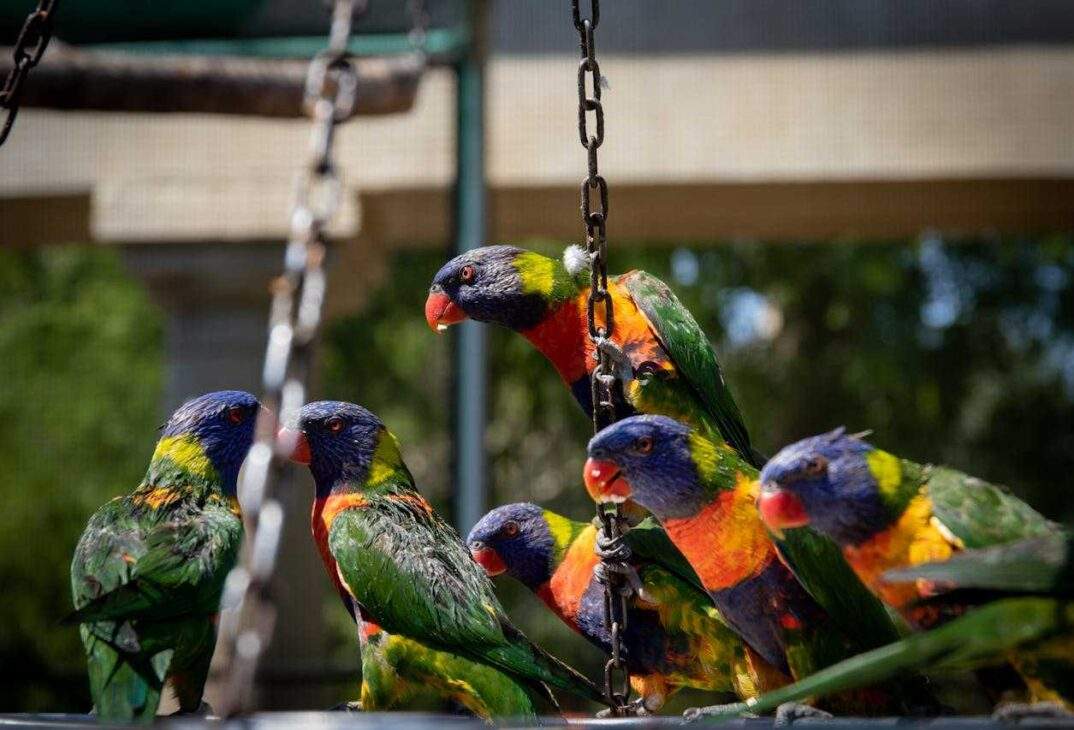
Bird Behavior Problems
Bird behavior problems can be challenging, but understanding the root causes and implementing effective solutions can help you create a harmonious relationship with your feathered friend. By providing a stimulating environment, consistent routine, and positive reinforcement, you can address and resolve common behavior issues, ensuring a happy and healthy life for your bird.
We’ve covered a lot of ground when it comes to common bird behavior problems. Remember, a happy bird is a well-adjusted bird! By understanding the root causes of these behaviors, implementing positive reinforcement techniques, and creating a stimulating environment, you’re well on your way to a more peaceful co-existence with your feathered friend. From addressing potential stressors to enriching their cage environment, we’ve provided a roadmap for fostering a positive and fulfilling relationship.
Of course, every bird is an individual, and sometimes professional help is needed. If your bird’s behavior problems seem severe or unmanageable, consulting an avian veterinarian or a qualified bird trainer is crucial. They can provide personalized guidance and ensure your feathery friend thrives.
So, armed with this knowledge, go forth and shower your bird with love, attention, and a sprinkle of patience! Remember, a little effort and understanding can go a long way in creating a happy and harmonious life for both you and your feathered companion.
Frequently Asked Questions: Bird Behavior Problems
1. My bird screams excessively. What could be causing it?
There are many reasons for excessive screeching, including boredom, seeking attention, fear or frustration, or even a medical issue. Identifying the trigger is key!
2. Why is my bird plucking its feathers?
Feather plucking can be a sign of stress, boredom, a lack of stimulation, or even a skin condition. It’s crucial to address the underlying cause.
3. My bird seems aggressive and bites sometimes. What can I do?
Bird bites can be a communication tool. Understanding bird body language can help identify triggers and avoid situations that might lead to biting. Positive reinforcement training can also be helpful.
4. My bird chews everything in sight! How can I redirect this behavior?
Provide your bird with plenty of safe chew toys to satisfy their natural chewing instinct. Rotate the toys regularly to keep them interesting.
5. My bird seems anxious and easily startled. How can I create a calmer environment?
Minimize loud noises and sudden movements. Provide hiding spots in their cage and offer positive reinforcement for calmness.
6. I’m bringing a new bird home. How can I prevent them from fighting?
Gradual introduction is key! Start with separate cages in the same room and slowly increase interaction time while supervising closely.
7. My bird is obsessed with me and gets upset when I leave. How can I help with separation anxiety?
Teach your bird that it’s okay to be alone by gradually increasing separation time and rewarding calm behavior during your absence. Provide stimulating activities to keep them occupied.
8. Is clicker training effective for birds?
Absolutely! Clicker training uses positive reinforcement and can be a great tool for addressing many behavior problems.
9. What enrichment activities can I provide for my bird?
Offer foraging toys, rotate cage decorations, and schedule supervised playtime outside the cage. Consider bird-safe vegetables and shredded paper for enrichment.
10. When should I consult a veterinarian about my bird’s behavior?
If the behavior seems severe, uncontrollable, or accompanied by physical signs of illness, consult an avian veterinarian to rule out any underlying medical conditions.

